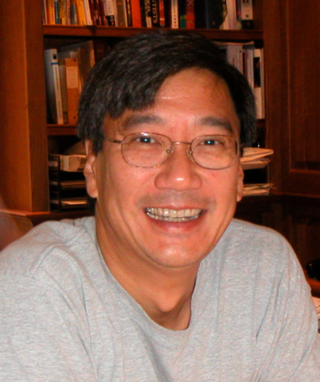Related Research Articles

Bjarne Stroustrup is a Danish computer scientist, known for the development of the C++ programming language. He led the Large-scale Programming Research department at Bell Labs, served as a professor of computer science at Texas A&M University, and spent over a decade at Morgan Stanley while also being a visiting professor at Columbia University. Since 2022 he has been a full professor at Columbia.
In computing, a compiler is a computer program that translates computer code written in one programming language into another language. The name "compiler" is primarily used for programs that translate source code from a high-level programming language to a low-level programming language to create an executable program.
Constant folding and constant propagation are related compiler optimizations used by many modern compilers. An advanced form of constant propagation known as sparse conditional constant propagation can more accurately propagate constants and simultaneously remove dead code.

Malcolm Douglas McIlroy is an American mathematician, engineer, and programmer. As of 2019 he is an Adjunct Professor of Computer Science at Dartmouth College. McIlroy is best known for having originally proposed Unix pipelines and developed several Unix tools, such as spell, diff, sort, join, graph, speak, and tr. He was also one of the pioneering researchers of macro processors and programming language extensibility. He participated in the design of multiple influential programming languages, particularly PL/I, SNOBOL, ALTRAN, TMG and C++.

Carl Sassenrath is an architect of operating systems and computer languages. He brought multitasking to personal computers in 1985 with the creation of the Amiga Computer operating system kernel, and he is the designer of the REBOL computer language, REBOL/IOS collaboration environment, the Safeworlds AltME private messaging system, and other products. Carl was a Principal Engineer at Roku, Inc. until his retirement in November 2023.

John Leroy Hennessy is an American computer scientist who is chairman of Alphabet Inc. (Google). Hennessy is one of the founders of MIPS Technologies and Atheros, and also the tenth President of Stanford University. Hennessy announced that he would step down in the summer of 2016. He was succeeded as president by Marc Tessier-Lavigne. Marc Andreessen called him "the godfather of Silicon Valley."
In compiler theory, dead-code elimination is a compiler optimization to remove dead code. Removing such code has several benefits: it shrinks program size, an important consideration in some contexts, it reduces resource usage such as the number of bytes to be transferred and it allows the running program to avoid executing irrelevant operations, which reduces its running time. It can also enable further optimizations by simplifying program structure. Dead code includes code that can never be executed, and code that only affects dead variables, that is, irrelevant to the program.
In compiler theory, common subexpression elimination (CSE) is a compiler optimization that searches for instances of identical expressions, and analyzes whether it is worthwhile replacing them with a single variable holding the computed value.
NLS, or the "oN-Line System", was a revolutionary computer collaboration system developed in the 1960s. It was designed by Douglas Engelbart and implemented by researchers at the Augmentation Research Center (ARC) at the Stanford Research Institute (SRI). It was the first computer system to employ the practical use of hypertext links, a computer mouse, raster-scan video monitors, information organized by relevance, screen windowing, presentation programs, and other modern computing concepts. It was funded by ARPA, NASA, and the US Air Force.
In compiler theory, dependence analysis produces execution-order constraints between statements/instructions. Broadly speaking, a statement S2 depends on S1 if S1 must be executed before S2. Broadly, there are two classes of dependencies--control dependencies and data dependencies.
In computer science, bounds-checking elimination is a compiler optimization useful in programming languages or runtime systems that enforce bounds checking, the practice of checking every index into an array to verify that the index is within the defined valid range of indexes. Its goal is to detect which of these indexing operations do not need to be validated at runtime, and eliminating those checks.
In computer science, an induction variable is a variable that gets increased or decreased by a fixed amount on every iteration of a loop or is a linear function of another induction variable.
New Implementation of LISP (NIL) is a programming language, a dialect of the language Lisp, developed at the Massachusetts Institute of Technology (MIT) during the 1970s, and intended to be the successor to the language Maclisp. It is a 32-bit implementation, and was in part a response to Digital Equipment Corporation's (DEC) VAX computer. The project was headed by Jon L White, with a stated goal of maintaining compatibility with MacLisp while fixing many of its problems.

The Mpowerment Project is a model community building and HIV prevention program designed specifically to address the needs of young adult gay/bisexual men ages 18 – 29. It is the first documented HIV prevention intervention for young gay/bisexual men to succeed in reducing sexual risk behavior. The program has been developed, evaluated, and continually refined by prominent behavioral scientists from the University of California, San Francisco's Center for AIDS Prevention Studies, the largest research center in the world dedicated to social, behavioral, and policy science approaches to HIV.
James George Mitchell is a Canadian computer scientist. He has worked on programming language design and implementation, interactive programming systems, dynamic interpreting and compiling, document preparing systems, user interface design, distributed transactional file systems, and distributed, object-oriented operating systems. He has also worked on the design of hardware for computer graphics, high-level programming language execution, and audio input/output.
Krishna V. Palem is a computer scientist and engineer of Indian origin and is the Kenneth and Audrey Kennedy Professor of Computing at Rice University and the director of Institute for Sustainable Nanoelectronics (ISNE) at Nanyang Technological University (NTU). He is recognized for his "pioneering contributions to the algorithmic, compilation, and architectural foundations of embedded computing", as stated in the citation of his 2009 Wallace McDowell Award, the "highest technical award made solely by the IEEE Computer Society".

Peter S. Kim is an American scientist. He was president of Merck Research Laboratories (MRL) 2003–2013 and is currently Virginia & D.K. Ludwig Professor of Biochemistry at Stanford University, Institute Scholar at Stanford ChEM-H, and Lead Investigator of the Infectious Disease Initiative at the Chan Zuckerberg Biohub.

Eric Goosby is an American public health official, currently serving as Professor of Medicine and Director of the Center for Global Health Delivery, Diplomacy and Economics, Institute for Global Health Sciences at University of California, San Francisco. Dr. Goosby previously served as the UN Special Envoy on Tuberculosis as well as previously served as the United States Global AIDS Coordinator from 2009 until mid-November 2013. In the role, Goosby directed the U.S. strategy for addressing HIV around the world and led President Obama's implementation of the President's Emergency Plan for AIDS Relief (PEPFAR). Goosby was sworn in during June 2009 and resigned in November 2013, taking a position as a professor at UCSF, where he directs the Center for Global Health Delivery and Diplomacy, a collaboration between UCSF and the University of California, Berkeley.
Gareth Loy is an American author, composer, musician and mathematician. Loy is the author of the two volume series about the intersection of music and mathematics titled Musimathics. Loy was an early practitioner of music synthesis at Stanford, and wrote the first software compiler for the Systems Concepts Digital Synthesizer. More recently, Loy has published the freeware music programming language Musimat, designed specifically for subjects covered in Musimathics, available as a free download. Although Musimathics was first published in 2006 and 2007, the series continues to evolve with updates by the author and publishers. The texts are being used in numerous mathematics and music classes at both the graduate and undergraduate level, with more current reviews noting that the originally targeted academic distribution is now reaching a much wider audience. Music synthesis pioneer Max Mathews stated that Loy's books are a "guided tour-de-force of the mathematics of physics and music... Loy has always been a brilliantly clear writer. In Musimathics, he is also an encyclopedic writer. He covers everything needed to understand existing music and musical instruments, or to create new music or new instruments. Loy's book and John R. Pierce's famous The Science of Musical Sound belong on everyone's bookshelf, and the rest of the shelf can be empty." John Chowning states, in regard to Nekyia and the Samson Box, "After completing the software, Loy composed Nekyia, a beautiful and powerful composition in four channels that fully exploited the capabilities of the Samson Box. As an integral part of the community, Loy has paid back many times over all that he learned, by conceiving the (Samson) system with maximal generality such that it could be used for research projects in psychoacoustics as well as for hundreds of compositions by a host of composers having diverse compositional strategies."
Julio S. G. Montaner is an Argentine-born Canadian physician, professor and researcher. He is the director of the British Columbia Centre for Excellence in HIV/AIDS, the chair in AIDS Research and head of the Division of AIDS in the Faculty of Medicine at the University of British Columbia and the past-president of the International AIDS Society. He is also the director of the John Ruedy Immunodeficiency Clinic, and the Physician Program Director for HIV/AIDS PHC. He is known for his work on HAART, a role in the discovery of triple therapy as an effective treatment for HIV in the late 1990s, and a role in advocating the "Treatment as Prevention" Strategy in the mid-2000s, led by Myron Cohen of the HPTN 052 trial.
References
- ↑ Muchnick, Steven Stanley (August 15, 1997). Advanced Compiler Design and Implementation . Morgan Kaufmann Publishers. ISBN 978-1-55860-320-2.
- ↑ "Profs devise computer aid for advising". The Journal World's Kansas University Edition. August 1977. Retrieved December 18, 2010.
- ↑ "A celebration of life Steve Muchnick".
- ↑ "Steven Muchnik Interview". The International Foundation for Alternative Research in AIDS, Inc. (IFARA). Archived from the original on July 26, 2011. Retrieved January 12, 2011.
- ↑ "2010 Council Members". San Francisco Department of Public Health, HIV Prevention Section. Archived from the original on July 24, 2010. Retrieved January 12, 2011.